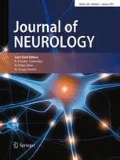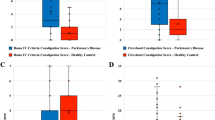Abstract.
Gastrointestinal dysfunction, especially constipation, is one of the major problems in the daily life of patients with Parkinson’s disease (PD). About 60 to 80% of PD patients suffer from constipation. Several studies have proven that constipation appears about 10 to 20 years prior to motor symptoms. More recently, Abbott et al. have found from a large scale prospective study that lower frequency bowel movements predict the future risk of PD. Furthermore, Braak et al. have found that Lewy neuritis and Lewy bodies, the hallmarks of PD pathology, appear in the dorsal nucleus of vagus in the earliest stage of the disease and then extend upward through the brain stem to reach the substantia nigra in the third stage. They also hypothesize that some yet undefined toxins break through the mucosal barrier of the intestine and are incorporated into the axon terminal of the vagus nerve and transported in a retrograde manner to the vagus nucleus. In this study, we assessed bowel movements and nutritional status in Japanese patients with PD. We found that intake of water was significantly decreased in PD patients from early life and associated with their constipation.
Ninety four patients with PD (M 50, F 44) were enrolled. Nutritional status was assessed using the Self-administered Diet History Questionnaire (DHQ). Total water intake was calculated from the consumption of coffee, green tea, and tea. We also questioned the behavior of water drinking from the early stage of life. The questionnaire for bowel movements concerned the frequency of defecation, age of onset of constipation, and age of onset of motor dysfunction. Less than one bowel movement in 3 days was defined as constipation.
The nutritional status of PD patients did not differ significantly from those of controls though several studies have shown excess intake of animal fats or reduced consumption of coffee are risks in PD. In contrast, water intake was significantly lower in PD patients than controls (604.0±377.2 ml/d vs 909.5±531.6 ml/d; P<0.0001). Interestingly, PD patients tended not to feel thirsty and thus they had no desire to drink water throughout their life. Seventy four patients out of 94 (78.7 %) complained of constipation. Mean bowel frequency was once per 3.3±1.1 days and 71.1% of patients were defined as having constipation. Women suffered from constipation more frequently than men (82.4% vs 61.9 %). In 33 patients out of 74 (44.6 %), onset of constipation preceded motor disturbance by an average time of 18.1±18.8 years. Furthermore, the amount of water intake correlated inversely with the severity of constipation and the depletion of water intake preceded constipation in most cases.
The present results support previous findings that constipation precedes the onset of motor dysfunction in PD. To our knowledge, this is the first report to point out latent water depletion in PD patients. It is not certain at present whether coffee or caffeine themselves are the protective factor for PD or alternatively the amount of water in coffee drinking is more essential. Prospective studies on a large scale are necessary to elucidate the real meaning of water depletion in PD.
Similar content being viewed by others
References
Ross GW, Abbott RD, Petrovitch H, Morens DM, Grandinetti A, Tung KH, Tanner CM, Masaki KH, Blanchette PL, Curb JD, Popper JS, White LR (2000) Association of coffee and caffeine intake with the risk of Parkinson Disease. JAMA 283:2674–2679
Ascherio A, Zhang SM, Hernan MA, Kawachi I, Colditz GA, Speizer FE, Willett WC (2001) Prospective study of caffeine consumption and risk of Parkinson’s Disease in men and women. Ann Neurol 50:56–63
Abbott RD, Petrovitch H, White LR, Masaki KH, Tanner CM, Curb JD, Grandinetti A, Blanchette PL, Popper JS, Ross GW (2001) Frequency of bowel movements and the future risk of Parkinson’s disease. Neurology 57:456–462
Tredici KD, Rüb U, de Vos RAI, Bohl JRE, Braak H (2002) Where does Parkinson Disease pathology begin in the brain? J Neuropathol Exp Neurol 61:413–426
Braak H, Del Tredici K, Rüb U, de Vos RAI, Jansen Steur ENH, Braak E (2003) Staging of brain pathology related to sporadic Parkinson’s disease. Neurobiol Aging 24:197–211
Braak H, Rüb U, Gai WP, Del Tredici K (2003) Idiopathic Parkinson’s disease: possible routes by which vulnerable neuronal types may be subject to neuroinvasion by an unknown pathogen. J Neural Transm 110(5):517–536
Sasaki S, Yanagibori R, Amano K (1998) Validity of a Self-Administered Diet History Questionnaire for assessment of sodium and potassium-comparison with single 24-hour urinary excretion. Jap Circ J 62:431–435
Logroscino G, Marder K, Cote L, Tang MX, Shea S, Mayeux R (1996) Dietary lipids and antioxidants in Parkinson’s Disease: A population-based, case-control study. Ann Neurol 39:89–94
Logroscino G, Marder K, Graziano J, Freyer G, Slavkovich V, Lojacono N, Cote L, Mayeux R (1998) Dietary iron, animal fats, and risk of Parkinson’s disease. Mov Disord 13:13–16
Johnson CC, Gorell JM, Rybicki BA, Sanders K, Peterson EL (1999) Adult nutrient intake as a risk factor for Parkinson’s disease. Int J Epidemiol 28:1102–1109
Anderson C, Checkoway H, Franklin GM, Beresford S, Smith-Weller T, Swanson PD (1999) Dietary factors in Parkinson’s Disease: The role of food groups and specific foods. Mov Disord 14:21–27
Hellenbrand W, Seidler A, Boeing H Robra BP, Vieregge P, Nischan P, Joerg J, Oertel WH, Schneider E, Ulm G (1996) Diet and Parkinson’s disease I: A possible role for the past intake of specific foods and food group. Neurology 47:636–643
Hellenbrand, Boeing H, Robra B-P, Seidler A, Vieregge P, Nischan P, Joerg J, Oertel WH, Schneider E, Ulm G (1996) Diet and Parkinson’s disease II: A possible role for the past intake of specific nutrients. Neurology 47:644–650
Fall P-A, Fredrikson M, Axelson O, Granerus AK (1999) Nutritional and occupational factors influencing the risk of Parkinson’s disease: A case-control study in southeastern Sweden. Mov Disord 14:28–37
de Rijk MC, Breteler MM, den Breeijen JH, Launer LJ, Grobbee DE, van der Meche FG, Hofman A (1997) Dietary antioxidants and Parkinson disease. The Rotterdam Study. Arch Neurol 54(6):762–765
Edwards LL, Quigley EMM, Pfeiffer RF (1992) Gastrointestinal dysfunction in Parkinson’s disease: frequency and pathophysiology. Neurology 42:726–732
Edwards LL, Pfeiffer RF, Quigley EM, Hofman R, Balluff M (1991) Gastrointestinal symptoms in Parkinson’s disease. Mov Disord 6:151–156
Singer C, Weiner WJ, Sanchez-Ramos JR (1992) Autonomic dysfunction in men with Parkinson’s disease. Eur Neurol 32:134–140
Korczyn AD (1990) Autonomic nervous system disturbances in Parkinson’s disease. Adv Neurol 53:463–468
Jost WH (1997) Gastrointestinal motility problems in patients with Parkinson’s disease: effects of antiparkinsonian treatment and guidelines for management. Drugs Aging 10:249–258
Singaram C, Ashraf W, Gaumnitz EA, Torbey C, Sengupta A, Pfeiffer R, Quigley EM (1995) Dopaminergic defect of enteric nervous system in Parkinson’s disease patients with chronic constipation. Lancet 346:861–864
Byrne KG, Pfeiffer R, Quigley EMM (1994) Gastrointestinal dysfunction in Parkinson’s disease: a report of clinical experience at a single center. J Clin Gastroenterol 19:11–16
Ashraf W, Pfeiffer RF, Park F, Lof J, and Quigley EM (1997) Constipation in Parkinson’s disease: objective assessment and response to psyllium. Mov Disord 12:946–951
Author information
Authors and Affiliations
Corresponding author
Rights and permissions
About this article
Cite this article
Ueki, A., Otsuka, M. Life style risks of Parkinson’s disease: Association between decreased water intake and constipation. J Neurol 251 (Suppl 7), vii18–vii23 (2004). https://doi.org/10.1007/s00415-004-1706-3
Issue Date:
DOI: https://doi.org/10.1007/s00415-004-1706-3




